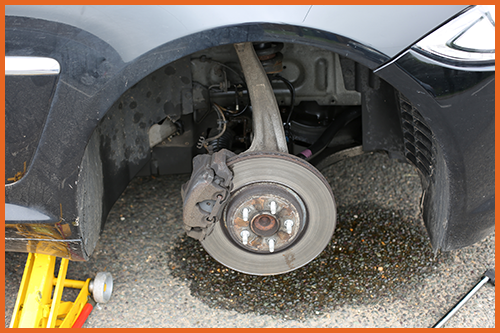What Is Brake Fluid?
First things first, let’s break down what brake fluid is.
Brake fluid is the hydraulic fluid used in the hydraulic brake system of most automatic and manual vehicles. This fluid is housed in the master cylinder, which acts as a sort of “plunger” when the brake pedal is depressed.
The master cylinder forces the fluid through the brake lines, causing the brake pads to press against the rotors and slow your car down.
Why Is My Brake Fluid Leaking?
The causes behind a brake fluid leak are numerous. From brake components damaged by wear and tear to rusting and pitting, your brakes can be compromised and it’s in your best interest to know what to look for.
Identify A Brake Fluid Leak
Light yellow or brown fluid beneath your vehicle.
A spongy or soft feeling when pressing your brake pedal.
Leaks are typically due to issues with the master cylinder, ABS module, brake line, bleeder valve, rotor, drum, pistons, or general brake assemblies. In order to zero-in on the cause, you’re going to have to jack your vehicle up and get beneath it to get a visual.
If the leak is light or difficult to locate, place newspaper beneath the car, then, with the car stationery and engine off, press the brake pedal repeatedly. This should force out brake fluid through any leaking components, which will show up on the newspaper.
Brake leaks can also occur internally and can flow from one component to another without any external alert.
If your fluid level keeps falling despite top-ups and you can’t see source or indication of leakage, refrain from driving the vehicle and visit your mechanic as soon as possible.
Is It Safe To Drive Leaking Brake Fluid?
Absolutely not.
It is in your best interest to not operate your vehicle with a major leak. Even small leaks can compromise the total efficiency of your brake system and cause a safety issue. Pull over and call in a tow.
If the leak causes your brakes to fail while driving, follow these steps:
Pump the brake pedal repeatedly to build up some pressure in the brake line and give it some more braking action.*
Pull over.
Don’t pull the parking brake unless you’re driving as slow as possible.
You're going to have to get your vehicle towed in and, if you’re willing, get the brake systems repaired.
*Note: If you have ABS in your vehicle, don't pump the breaks. Press down hard instead — the system will automatically pump for you.
How To Fix A Brake Fluid Leak
Repairing a brake fluid leak completely relies on the source of the leak. If you aren’t comfortable getting under your car and inspecting it thoroughly, the option to take it to an expert mechanic is always on the table.
If you choose to find the leak yourself, there are a few items you’ll need:
Car Jack
Wheel Blocks
Necessary Repair Components
Car Maintenance Tools
Brake Leak Repair Costs
Fixing a brake leak will vary depending on the vehicle. The national average any car owner can expect to pay to repair brake leaks is between $20 and $500 — that’s for the parts and labor of a single brake line.
Replacing your entire brake system, however, can run you anywhere from $1000 to $2000 depending on your car.
What Are My Options If I Don’t Want To Repair My Leaking Brakes?
DamagedCars specializes in buying cars with all types of damage, leaking brakes included!
Our goal is to make sure your entire process goes as smoothly and easily as possible. The entire process can be summed up in three simple steps:
Get a free quote! Enter a few pieces of basic information about your car and you’ll receive a free quote within 90 seconds.
Schedule your pickup within 24-48 hours! If you’re happy with your quote, you’ll be able to schedule your vehicle retrieval with one of our partners within your area. Don’t worry about towing fees; it’s on the house!
Complete your sale! One brief inspection and title transfer later, you’ll receive the amount you were quoted without any haggling whatsoever. Your vehicle is taken off your hands and money is put in them!
Contact DamagedCars today and sell your car without leaving your own home!



